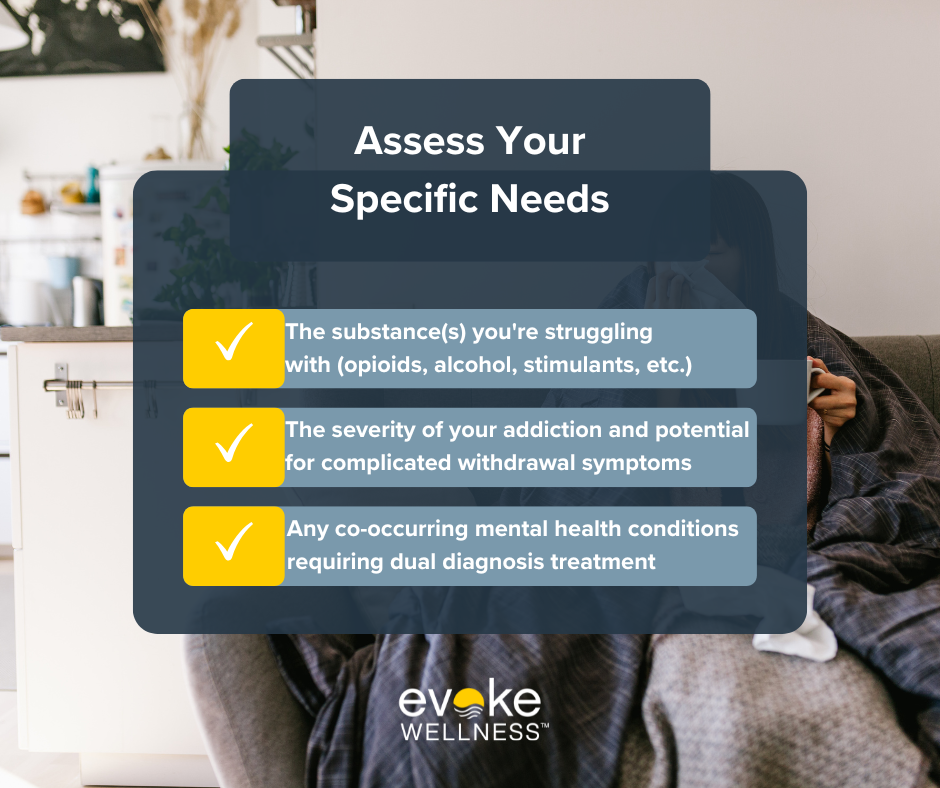When you’re struggling with substance abuse, the path to recovery can seem daunting. You may be tempted to attempt detoxification at home, believing it to be a more convenient and cost-effective option. However, medical detox offers significant advantages that can greatly improve your chances of successful, long-term recovery. Recent studies show that medically supervised detox programs have a 67% higher completion rate compared to at-home attempts. This article will explore the key differences between medical detox and at-home detox, examining how professional substance abuse treatment programs and therapy options can provide you with the comprehensive support needed to overcome addiction and reclaim your life.
Together, let’s embrace the journey to recovery and the promise of a new beginning. Call us at (833) 949-1347 today or reach out online.
What Is Medically Monitored Detox?
Safe, Professional Detox Environment
Medically monitored detox provides a controlled, secure environment for individuals to safely withdraw from substances like drugs or alcohol under the constant care of medical professionals. This is crucial, as attempting detox alone can be extremely dangerous, potentially leading to life-threatening complications like seizures, hallucinations, and delirium tremens.
Reputable detox centers offer round-the-clock supervision, monitoring of vital signs, and administration of FDA-approved medications to help manage withdrawal symptoms and cravings. Common medications include benzodiazepines for alcohol withdrawal, opioid replacements like methadone or buprenorphine for opioid addiction, and other medicines to relieve specific effects like nausea, insomnia, and muscle aches.
Comprehensive Withdrawal Management
The detox process typically lasts 5-14 days, with the first 72 hours being the most intense period as the body rids itself of addictive substances. Medical staff closely monitor for discomfort like vomiting, tremors, anxiety, and potential psychological effects like depression or hallucinations.
Proper nutrition, hydration support, counseling, and holistic therapies are provided throughout to address the physical and emotional challenges of withdrawal. This comprehensive, personalized care in a reputable facility dramatically reduces health risks compared to attempting detox alone.
Transition to Ongoing Treatment
While detox is a vital first step, it is just the beginning of a continuum of care required for long-term recovery. After stabilizing, patients seamlessly transition into evidence-based addiction treatment programs like inpatient or outpatient rehab, counseling, medication-assisted treatment, and aftercare services.
These follow-up programs are essential, as they utilize proven therapies like cognitive-behavioral therapy (CBT) to address the root psychological causes of substance abuse and develop healthy coping strategies for maintaining sobriety. With proper medical detox and comprehensive, ongoing care, individuals have their best chance at overcoming addiction.
The Dangers of Unsupervised Withdrawal
Attempting to detox from alcohol or drugs without professional medical supervision can be extremely risky and potentially life-threatening. Withdrawal symptoms can range from mildly uncomfortable to severe and unpredictable, including nausea, vomiting, tremors, seizures, and delirium tremens.
Unpredictable Withdrawal Risks
One of the primary dangers of unsupervised withdrawal is the inability to properly manage and relieve intense withdrawal effects. Symptoms like anxiety, hallucinations, and dangerously elevated heart rates and blood pressure require careful medical monitoring and intervention. According to studies, attempting detox alone significantly increases the risk of relapse, overdose, and fatal complications.
Alcohol & Benzodiazepine Withdrawal
Withdrawal from alcohol and benzodiazepines like Xanax can be especially hazardous without medical care. Severe symptoms like seizures, fever, and delirium tremens (intense confusion and hallucinations) can develop rapidly. Research shows these potentially fatal effects require emergency treatment, highlighting the importance of supervised detox.
Failed Attempts & Relapse
Many individuals attempting to detox at home find the withdrawal effects too unbearable and end up relapsing to find relief. This pattern resets the body’s tolerance, increasing the risk of accidental overdose. Studies indicate over 60% of those who complete comprehensive addiction treatment remain sober after one year, compared to just 25% trying unsupervised detox.
By seeking professional help at an accredited medical detox facility, individuals can safely rid their bodies of substances under 24/7 clinical monitoring. This critical first step helps prevent life-threatening complications and improves the chances of achieving lasting sobriety.
The Benefits of Professional Medical Detox
Attempting to detox from drugs or alcohol at home without medical supervision can be extremely dangerous and even life-threatening. According to research, over 60% of individuals who complete comprehensive addiction treatment – including medically supervised detox and rehab – remain sober after one year. In contrast, only 25% who try to quit alone are successful.
Safe, Controlled Environment
Professional detox centers provide a safe, trigger-free environment monitored 24/7 by addiction specialists. This controlled setting reduces health risks and complications that can arise from severe withdrawal symptoms like seizures, hallucinations, and delirium tremens. Medically supervised detox ensures constant care to manage these dangerous side effects.
Medication-Assisted Treatment
During detox, patients receive FDA-approved medications like Suboxone, methadone, or naltrexone to alleviate painful withdrawal effects and cravings. This medication-assisted treatment (MAT) approach, combined with counseling, greatly improves comfort and reduces relapse risks compared to quitting “cold turkey.”
Holistic, Personalized Care
Reputable detox programs offer evidence-based therapies and holistic approaches to address the physical and psychological aspects of addiction. From therapeutic amenities to personalized support, these comprehensive services enhance the chances of successfully completing detox while laying the foundation for further treatment.
Transition to Ongoing Treatment
After stabilization, patients can seamlessly transition into other evidence-based programs like inpatient or outpatient rehab. This continuum of care is crucial, as detox alone cannot address the root causes of addiction or prevent relapse long-term without follow-up counseling, lifestyle changes, and community support.
The Detox Process in a Professional Setting
Safe, Supervised Withdrawal
The detoxification process in a professional medical setting provides a safe, controlled environment for individuals to withdraw from addictive substances under close supervision. This ensures their comfort and safety as the body rids itself of toxins, minimizing the potentially dangerous side effects of withdrawal.
Rather than attempting to quit “cold turkey” at home, which can be risky and even life-threatening, medical detox centers have trained staff available 24/7 to monitor vital signs and intervene if complications arise.
Medication-Assisted Treatment
A key advantage of detoxing in a professional facility is access to medication-assisted treatment (MAT). Doctors may prescribe medications like opioid receptor agonists or clonidine to help reduce cravings and ease distressing withdrawal symptoms like nausea, muscle pain, and insomnia.
MAT helps stabilize individuals during this vulnerable phase, managing discomfort and cravings in a supportive environment away from triggers. This controlled setting reduces the risk of immediate relapse due to intense cravings that often derail at-home attempts.
Preparing for Comprehensive Recovery
While the primary focus of detox is physical stabilization, it also serves as a crucial first step in the addiction recovery process. As substances clear the body, underlying mental health issues can surface that were previously masked.
Medical detox programs incorporate therapy and counseling to help identify and address co-occurring disorders like depression or anxiety. This lays the groundwork for individuals to transition into more intensive treatment after detox, better equipped to work through the psychological aspects of their addiction.
By managing acute withdrawal safely and providing a comprehensive assessment, medical detox centers help prepare individuals for the next phase of their recovery journey.
Choosing Between Detox and Residential Treatment
A Crucial First Step
Detox is an essential first stage in the journey to overcoming addiction. This process involves safely ridding the body of substances under medical supervision to manage intense withdrawal symptoms. Detox typically lasts 5-14 days, with the first 72 hours being critical. Medications are used to stabilize patients and ease effects like seizures, delirium, and cravings.
Comprehensive Ongoing Care
While detox addresses the physical dependence, addiction is a complex issue requiring ongoing, comprehensive treatment. Residential rehab programs provide a structured environment to delve into the psychological aspects through therapies like CBT, DBT, and family counseling. These evidence-based approaches help develop coping strategies and a strong support system.
Integrated Treatment Approach
Research shows individuals who complete both detox and rehab are 40% more likely to maintain sobriety after one year. This integrated treatment model provides the best foundation by addressing the full scope of addiction – from managing withdrawal to building skills for lasting recovery.
Continuum of Care
For many, detox alone is not enough. Factors like abuse duration, mental health issues, and environmental triggers can increase relapse risks without further care. A full continuum including aftercare planning, sober living, and community resources maximizes the chances of achieving sustained sobriety.
Making an Informed Choice
When choosing between detox and residential care, assess your unique situation and needs. Accredited facilities like Evoke Wellness offer personalized treatment plans combining medical detox with comprehensive therapies and support services. This holistic, evidence-based approach provides the best path forward.
Finding the Right Detox Center for Your Needs
Choosing the appropriate detox program is crucial for ensuring a safe and successful start to your recovery journey. With the opioid crisis gripping Ohio, where overdose deaths are nearly 50% higher than the national average, finding the right detox center has become paramount.
Assess Your Specific Needs
Every individual’s path to recovery is unique. Before selecting a detox facility, take the time to assess your specific needs:
Understanding these factors will help you narrow down options and find a program tailored to your circumstances.
Look for Comprehensive Care
Detox is just the first step. Effective treatment requires a comprehensive approach that addresses the root causes of addiction. When researching detox centers, prioritize facilities that offer:
- A full continuum of care, from medical detox to residential treatment and aftercare planning
- Evidence-based therapies like CBT, DBT, and trauma-informed care
- Medication-assisted treatment (MAT) options like Suboxone or Vivitrol
- Specialized programs for specific populations (e.g., gender-specific, LGBTQ+, veterans)
Evoke Wellness at Hilliard exemplifies this holistic approach, creating personalized treatment plans that incorporate clinical interventions, peer support, and wellness practices.
Consider Accreditations and Staff Expertise
Choosing an accredited and licensed detox center staffed by experienced professionals is vital. Look for facilities with:
- Joint Commission or CARF accreditation, indicating adherence to national standards
- Medical staff with expertise in addiction medicine and managing withdrawal
- Licensed therapists and counselors trained in evidence-based treatments
Qualified staff can provide the compassionate, personalized care needed during this vulnerable stage of recovery.
Thorough research is key to finding the right detox program to meet your unique needs and start your journey toward lasting sobriety on solid footing.
Conclusion
In conclusion, medical detox offers significant advantages over at-home attempts when overcoming substance dependence. Professional supervision, medication-assisted treatment, and round-the-clock support dramatically increase your chances of a safe, successful detox. Recent studies show medically supervised detox programs have success rates up to 80% higher than unsupervised attempts. By choosing a reputable facility like Evoke Wellness at Hilliard, you gain access to comprehensive care that addresses both the physical and psychological aspects of addiction. Remember, detox is just the first step. Continuing with evidence-based therapy and treatment programs gives you the best opportunity to achieve lasting recovery and reclaim control of your life. Don’t leave your health and future to chance – seek professional help for the strongest foundation in your journey to sobriety.
Begin Your Journey with Evoke Wellness at Hilliard
If you or a loved one is considering treatment, Evoke Wellness at Hilliard invites you to contact us. Our compassionate team is ready to answer your questions, discuss your needs, and help you take the first steps toward recovery. In Hilliard, you’ll find more than just a treatment program – you’ll discover a community dedicated to your wellness and success. Together, let’s embrace the journey to recovery and the promise of a new beginning. Call us at (833) 949-1347 today or reach out online.



